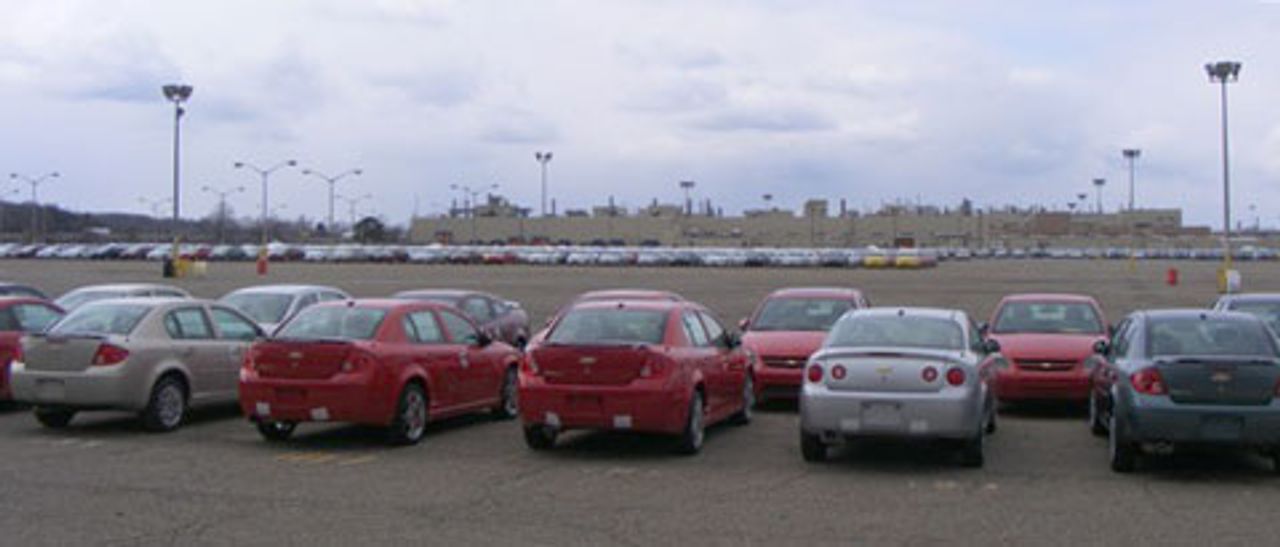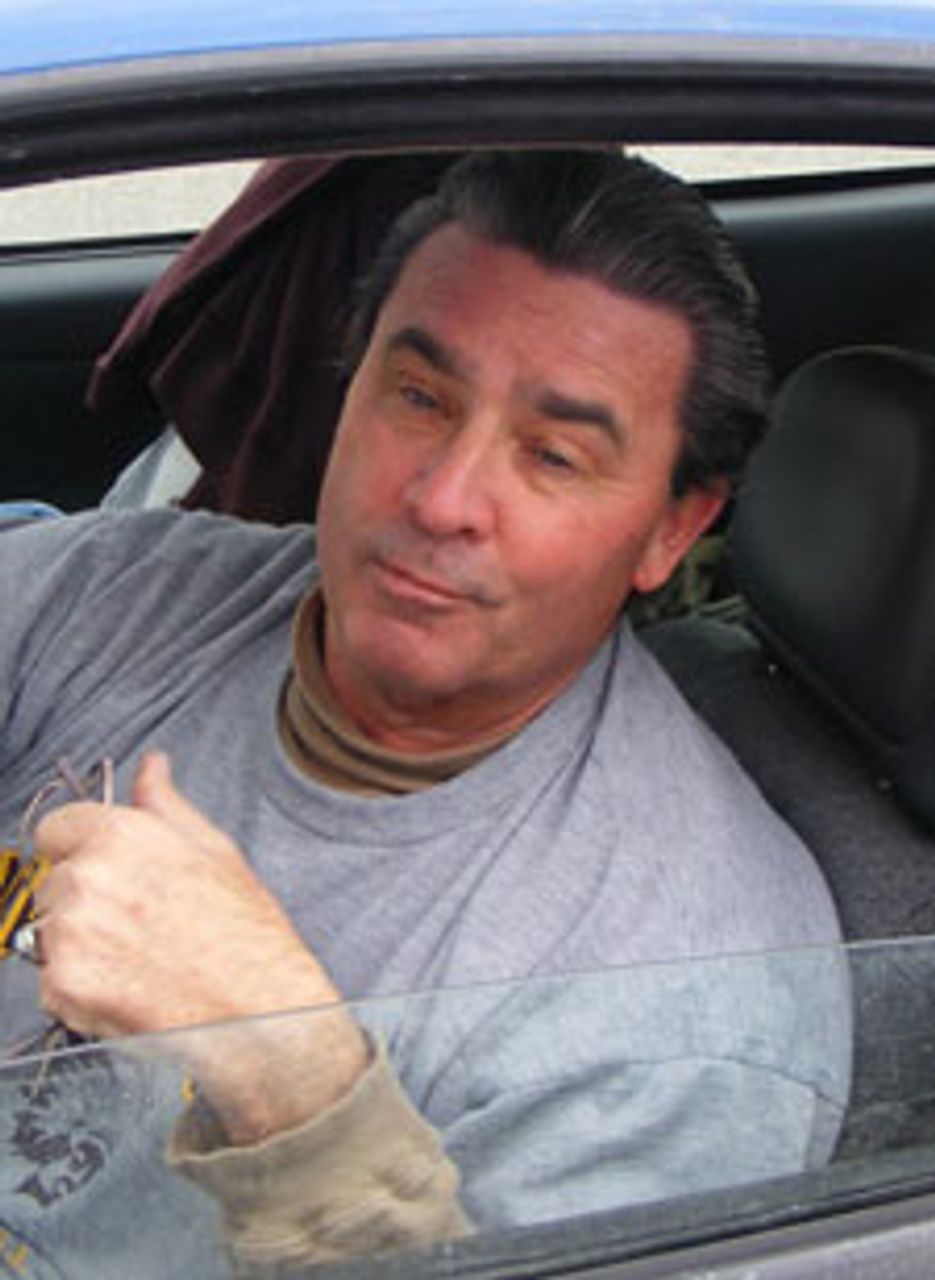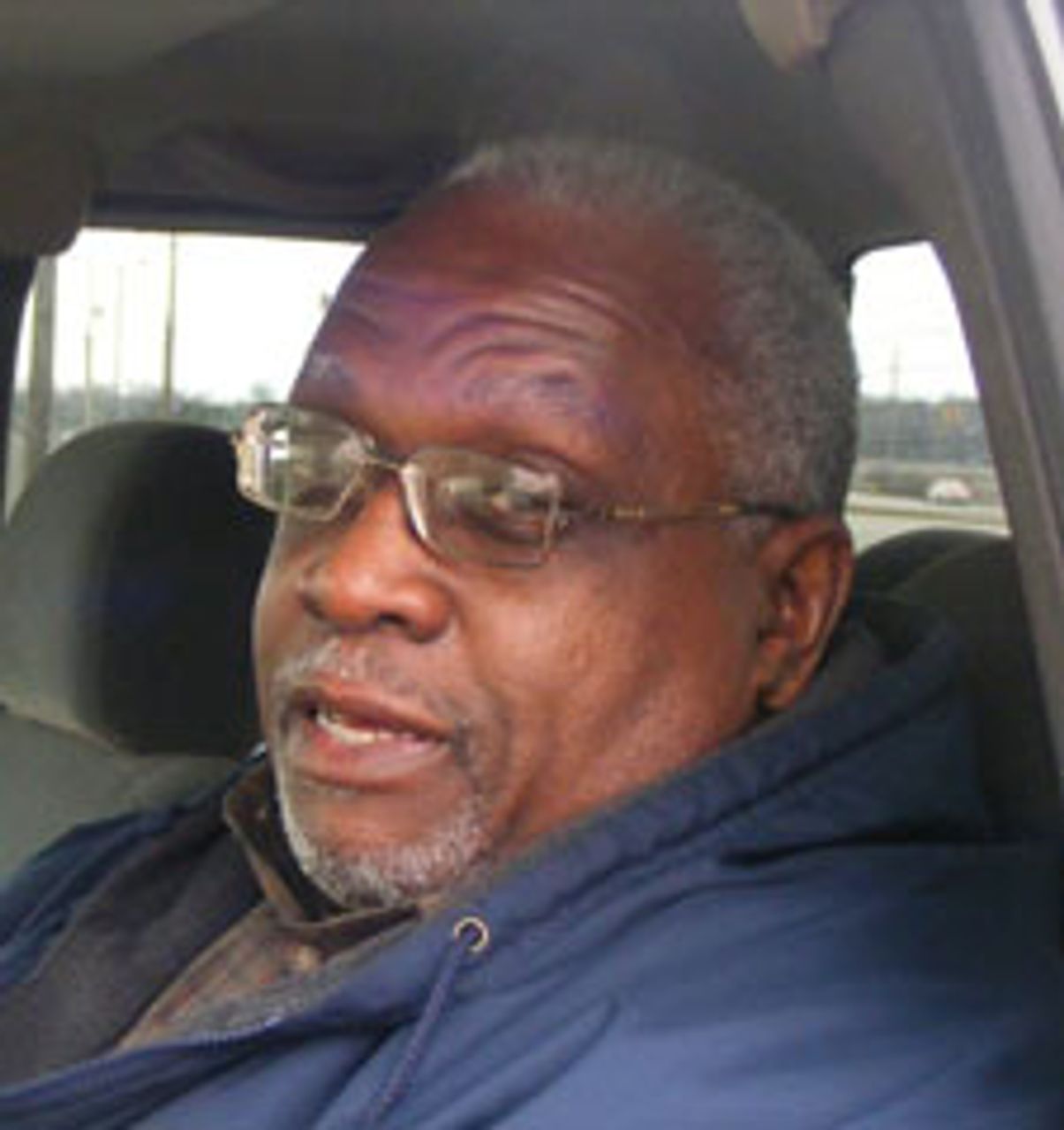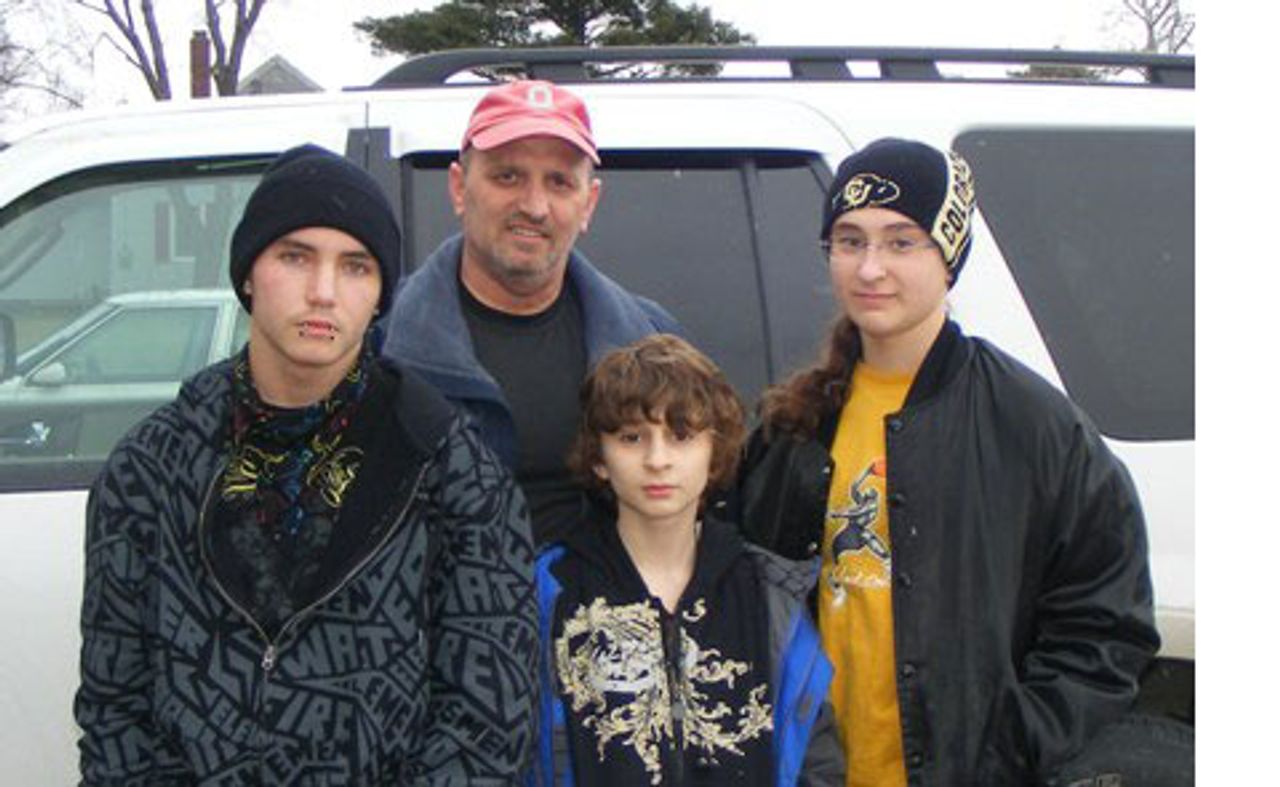General Motors recently announced plans to eliminate the second shift at its Lordstown, Ohio, complex in April, laying off 800 workers. Just last December GM cut the third shift at the facility, slashing 900 jobs.
 Unsold cars at the Lordstown plant
Unsold cars at the Lordstown plant
As recently as this summer over 4,000 were working on three shifts at the several plants that make up the Lordstown complex. Currently the workforce is down to 2,500, and with the layoffs in April the number of workers will fall below 2,000.
Lordstown produces Chevrolet Cobalt and Pontiac G5 cars. Sales of the small fuel-efficient cars spiked last spring, as gas prices were on the rise to over $4 a gallon. But with the deepening of the housing crisis and recession, car sales have plummeted.
Cobalt sales, which were over 26,000 last May, fell to 6,400 in October and November. December sales rebounded somewhat to 12,700 units, but that was still a 27 percent drop from a year before. Dealers have thousands of unsold cars, and thousands more sit in an enormous parking lot outside the Lordstown plants.
A General Motors spokesperson said the plant is currently running just one shift. One week the afternoon shift works and the following week the day shift works, until April 9 when the second shift is eliminated completely.
GM is still going ahead with retrofitting the fabricating plant for its new Cruze model, which is expected to go into production in 2010. However, nothing is certain given the precarious state of the company.
The World Socialist Web Site recently spoke with skilled trades workers at the Lordstown complex. John, a die maker with 31 years experience, said, “The union is not saying a whole bunch. Everybody is just holding their breath. We gave up a lot of stuff in the last contract so that there would not be any layoffs. There are a whole lot of people in here who are making just $14 an hour. Now the union has given up the Jobs Bank, so the people who get laid off will only have unemployment. That is not very much.
“We have half the workforce we used to have, and next month they will cut another shift. We are still working to bring the Cruze online. We are supposed to have some cars ready by October so they can crash test them, but who knows if that is still going to happen.”
 Burt Pollock
Burt Pollock
Burt Pollock, with 32 years in the skilled trades, said “It is terrible. Nobody knows what is going to happen, if they are going to have a job tomorrow and be able to support their family. It is not only us, but our kids are in trouble. I grew up in a great time in America. I work very hard, but I was able to be part of middle-class America. I am sending three kids to college, but what will happen to them? Where will they be able to find work?
“They raised the base price of the 2008-09 models by $1,400. I would like to know why they did that. I want to be able to build an affordable car.”
The layoffs at Lordstown were announced by GM prior to the company’s February 17 public statement that it would cut 47,000 workers worldwide as part of the restructuring plan demanded by the Obama administration in exchange for government loans to keep the automaker from going bankrupt. Workers were not sure if the Lordstown layoffs were part of that 47,000 figure or in addition to it.
United Auto Workers locals 1112 and 1714 are the bargaining units at Lordstown. They have collaborated with the union’s national leadership in pushing through massive concessions at Lordstown, supposedly to “save jobs.” Dave Green, the president of Local 1714, was cited in the Wall Street Journal in 2007 as a key player in assisting the central union leadership in pushing through that year’s concessionary national contract.
Many of those newly hired at Lordstown this year, when the plant was expanding production, are being paid just $14 an hour, under the terms of the 2007 contract. These younger workers, who were hoping to have a steady job, are now being laid off, and even workers with years of seniority are threatened.
In December the UAW leadership agreed to the elimination of the Jobs Bank, which had enabled some laid-off workers to continue receiving their pay. Last week, the UAW agreed to further concessions, including limits on overtime, changes in work rules, cuts in lump-sum bonuses and the elimination of cost-of-living raises. The only issue on which the union is resisting is the company’s demand that it accept company stock in lieu of cash payments owed to the UAW-controlled retiree health care trust fund.
 Morris Collins
Morris Collins
Morris Collins, a worker with 41 years seniority, said, “I don’t like it. We have been giving concessions all these years to ‘save jobs’ and now everyone is getting laid off anyway.
“They are going to cut our health benefits. I have a friend who has cancer. His medication costs $5,500 a month. Where is he going to be able to find an insurance policy to cover him when General Motors cuts his health care? He might as well drop dead.
“People work hard here all their lives so they can have something, and these people are going to take it away. These congressmen in Washington, they are demanding that we give up our benefits, yet they gave hundreds of billions to the bankers. They work four years and they get health insurance and a pension for life. And what do they do? They go to a few meetings, and half of them they don’t even show up.
“I come to work every day, working hard, breathing in all kinds of chemicals and dirt, and they want to take my health care away when I retire. The politicians complain about our sub pay [supplemental jobless pay], but that is money we put in each week out of our pay to cover times when there are layoffs.
“I also don’t like what they are doing to the salaried employees. I know three guys who were just told they have to move to Kansas. They didn’t give them any kind of warning or anything. I have worked in 5 different plants, but at least I knew in advance that I needed to move and I could make plans. They just told them, ‘Move to Kansas, or else.’
“It seems like every company is just trying to make the working people pay for their problems.”
Many workers fear that General Motors plans to go bankrupt so that it can rid itself of pensions and health benefits owed to its workers and retirees.
Another worker, who asked that his name not be used, said: “I have been here 30 years, and we hear more from you than from anyone. No one knows what is going on.
“We have given enough. It is time our backers give some more. I wish I could show you our union contract from today and from ten years ago, so you could see how much we have given up. I can only go see my doctor five times.
“I feel that the company is going to go bankrupt and just like the steel mills, we will lose our pensions and health insurance. I have worked here 30 years. I feel I deserve to get a pension. It would be about $1,600 or $1,700 a month. I figured it out—if General Motors goes bankrupt, I would only get $700 or $800 a month, plus I would have to pay for health insurance until I qualify for Medicare. That is what I worked my whole life for?
“I started working in the late ‘70s. The union in the early ‘70s was very militant. They were able to tell General Motors how things were going to be. Now everything has been taken away and the union is working with the company against the members.”
The Lordstown plant was built in 1966 and then retrofitted in 1970 to produce GM’s first small car model. It was at that time the most automated plant in the world. Production at the plant ran at a staggering speed of 100 cars an hour, meaning that a car rolled off the assembly line every 36 seconds.
General Motors placed the facility in a rural area of northeastern Ohio, about equal distance from the towns of Youngstown and Warren, then major steel centers. GM hoped that a rural workforce would be more docile than workers in the urban centers. However, Lordstown workers staged a series of protests and slowdowns against the brutal line-speed and dictatorial management methods, culminating in a three-week strike in the spring of 1972.
The UAW leadership worked to sabotage the struggle, and while GM did back down on some of its management methods, the UAW agreed to maintain the line speed.
The current layoffs will have a devastating impact on the working class population in Lordstown and the surrounding region. The GM plant is the largest employer in the area. According to official figures, unemployment in the Youngstown-Warren-Boardman metropolitan area, which includes Lordstown, is 8.9 percent, up from 5.7 percent in November 2007.
The unemployment rate is 9 percent in Warren and a staggering 14.1 percent—one in seven workers—in Youngstown. These figures do not take into account the enormous number of workers who are not counted in the official jobless tally because they have given up looking for work.
Even before the current slump, the Youngstown-Warren area was very depressed, never having recovered from the collapse of the steel industry in the 1980 and 1990s. Both cities continue to see a population decline, and household income is far below the national average. In Warren, the median household income was $33,122 in 2007, and in Youngstown it was just $24,924—less than half of the US figure of $50,000.
 The Yeager family
The Yeager family
Carl Yeager works as a salesman for a local manufacturing firm. “Things are bad around here,” he told the WSWS. “It is a domino effect. Every day it hits the automakers, it also hits us and a lot of other smaller companies that depend upon auto sales. Then people who are laid off can’t buy as much, so it hurts all the way down to the little mom and pop store.
“General Motors and the people who work there pay a lot of taxes to Lordstown. That means a lot of services will get cut. This is affecting everyone.
“We have 74 people were I work. Luckily there haven’t been any layoffs yet, but the company has eliminated all overtime.
“This valley has never recovered from the closing of the steel mills, and now this is going to be its last leg. I have three children. I tell them they will have to go to college, but then they will probably have to leave this area to find something. I know a lot of college graduates who are out of work right now and who are hurting.”
Archie Davis and his wife Jeanie spoke to the WSWS about living conditions in Warren. “I was laid off just before Christmas. I worked for a company that did home remodeling—siding and that kind of thing. He paid us through Christmas even though we didn’t work, so that was nice of him.
“He just didn’t have enough jobs to keep everybody working. It isn’t because of the weather. We used to work year-round. If it was raining or too cold to be putting up siding, we were working inside, redoing a kitchen or a bathroom or maybe fixing up a game room or something like that. I was making $12.75 an hour.
“I have signed up for unemployment, but I am not sure how much that will be and how long that will last. My wife works part-time up at the mall, but things are very slow there, and they are cutting back her hours. She doesn’t make enough for our family to live on. There are no jobs around here. I have been checking with many of my friends who also work doing construction, and they say everyone is cutting back on work.
“We still have to pay the mortgage, gas, electricity and the phone. I have two young kids, and you have to buy them clothes and food and take them to the doctor when they get sick.
“The politicians don’t care about the people. All they care about is the wealthy. Everybody put Obama in because we hated Bush so much, but I see him giving billions to the banks and I don’t see what is being done to help us.”
